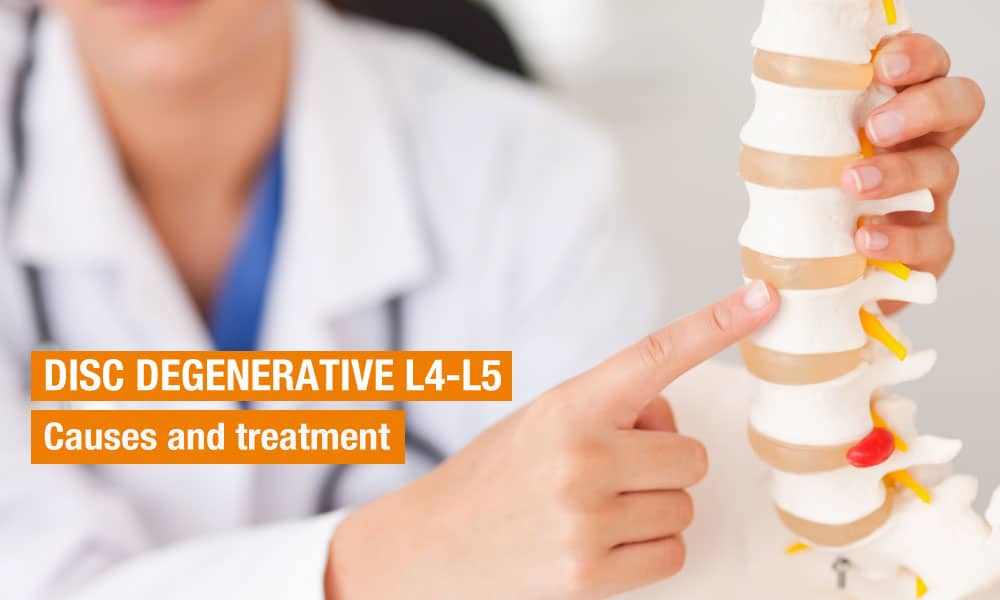Disc Degenerative L4-L5: Causes and Treatment
QI Spine Clinic, 3 years ago
The L4-L5 are the two lowest vertebrae of the lumbar spine. The L4-L5 disc is at a high risk of
degeneration which is mainly due to the increased load at the L4-L5 motion segment and decreased movement in the segments below this level.
DISC DEGENRATIVE DISEASE L4-L5 SYMPTOMS
Some of the most common
degenerative disc disease L4-L5 symptoms include:
- Pain that worsens with specific movements such as bending or twisting
- Periods of severe pain that come and go
- Pain that radiates to the nearest limb
- Lower back pain (if the degenerated disc is in the lower back)
- Pain in the neck and shoulders (if the degenerated disc is in the upper back)
- Tingling in the legs or fingers which is caused by nerve impingement
DISC DEGENRATIVE DISEASE L4-L5 CAUSES
- Loss of fluid in the disc – The center of a healthy disc can contain up to 80 per cent water which allows it to function as a shock absorber. When the water content in these discs starts to decrease, they are no longer as spongy and flexible which puts pressure on the outer layer of the disc.
- Tiny tears or cracks in the outer layer of the disc – Pressure on the outer layer of a disc can result in the development of small tears. The jellylike material from inside the disc can then seep through these cracks – a condition known as a herniated disc.
DISC DEGENRATIVE DISEASE L4-L5 DIAGNOSIS
Your doctor will check your medical history and current symptoms. You may be asked a few questions like when the pain started, which part of the spine hurts, what is your pain level, or if you have a family history of similar problems. Your spine will be checked for symptoms such as pain in your lower back or neck. You may also be asked to walk or bend to check which movements cause pain or what makes your back feel better or worse. You might be advised to get a few imaging tests like x-ray, CT scan, MRI scan to evaluate bone or nerve damage near your spine.
HOW QI SPINE DIAGNOSES L4-L5 DISC DEGENRATIVE DISEASE?
MRI and X-ray tests are can only detect damage to bone and tissue but they cannot pinpoint weak muscles that cause or aggravate the problem.
Digital Spine Analysis (DSA) is the most technologically advanced spine function test that can identify weakened muscles. This allows
Qi Spine specialists to provide precise and targeted treatment for quick but lasting pain relief.
DISC DEGENRATIVE DISEASE L4-L5 TREATMENT
Conservative treatment is the first choice for treating L4-L5
disc degenerative disease. Following measures may improve your degenerative disc diseases symptoms: –
- Rest
- Ice therapy
- Heat therapy
- Massage therapy
- Physical therapy
- Yoga
Besides,
over-the-counter medications are available such as nonsteroidal anti-inflammatory drugs, muscle relaxants.
Therapeutic injections like epidural corticosteroid shots, nerve blocks, and trigger point injections can provide you relief.
HOW QI SPINE TREATS L4-L5 DISC DEGENRATIVE DISEASE?
QI Spine has adopted a unique approach that combines holistic therapy with evidence-based treatment protocols. This ensures quick and long-lasting relief from
back pain caused by
degenerative disc disease. QI customizes every treatment protocol depending on the needs of each patient in order to reduce pain as well as prevent the recurrence of the underlying problem. The McKenzie Method used is an effective physical therapy system to correct and stabilize spinal alignment. Medical movements such as the Global Stabilization System and kinetic control focuses on improving mobility, decreasing pain, and reducing the risk of pain recurrence.
DISC DEGENRATIVE DISEASE L4-L5 PREVENTION
The best way to keep your spine strong is to lead a healthy lifestyle, which includes getting regular exercise, eating a well-balanced diet, and avoiding harmful risk factors such as smoking and carrying excess weight.
WHEN TO SEE A SPINE SPECIALIST?
If your symptoms don’t improve or if you suspect having a degenerative disc disease; you must visit a spine specialist immediately.

